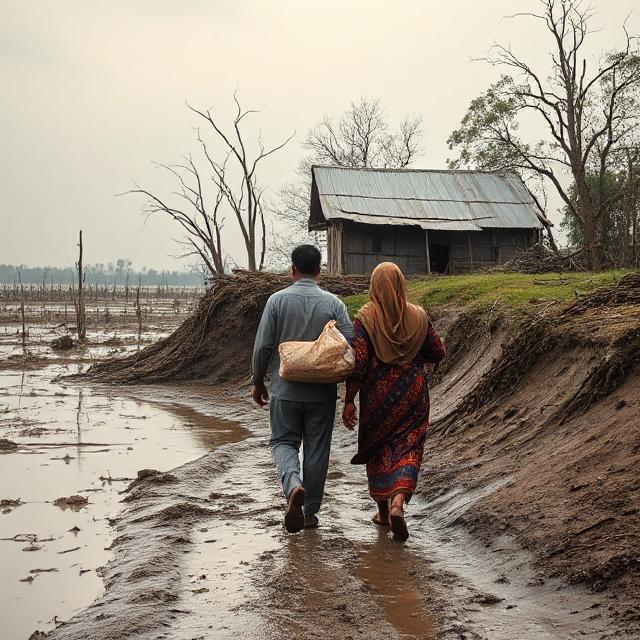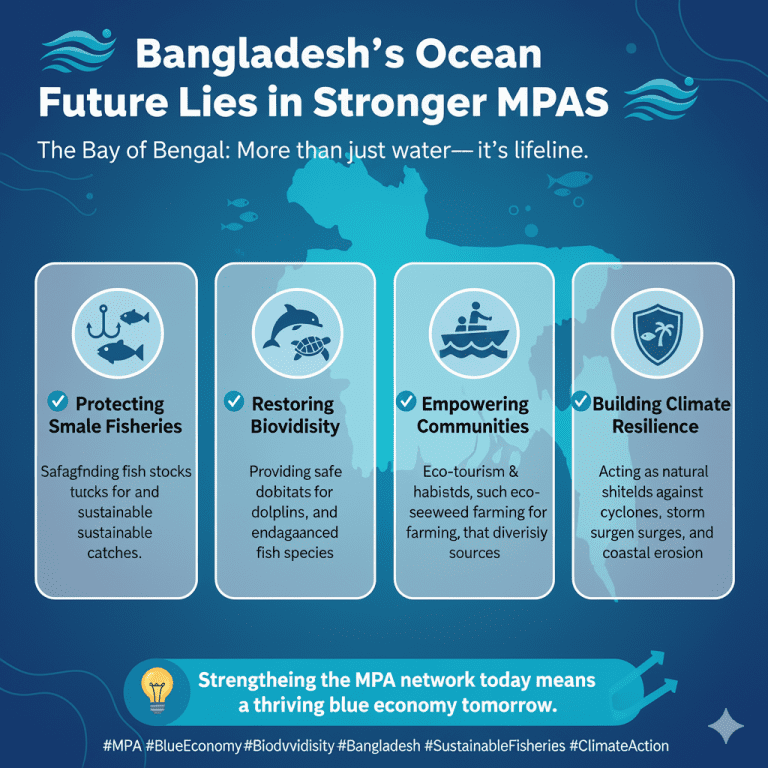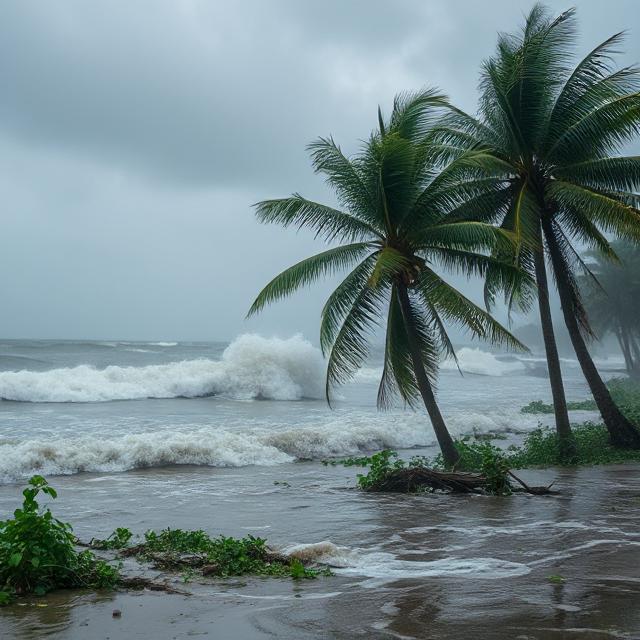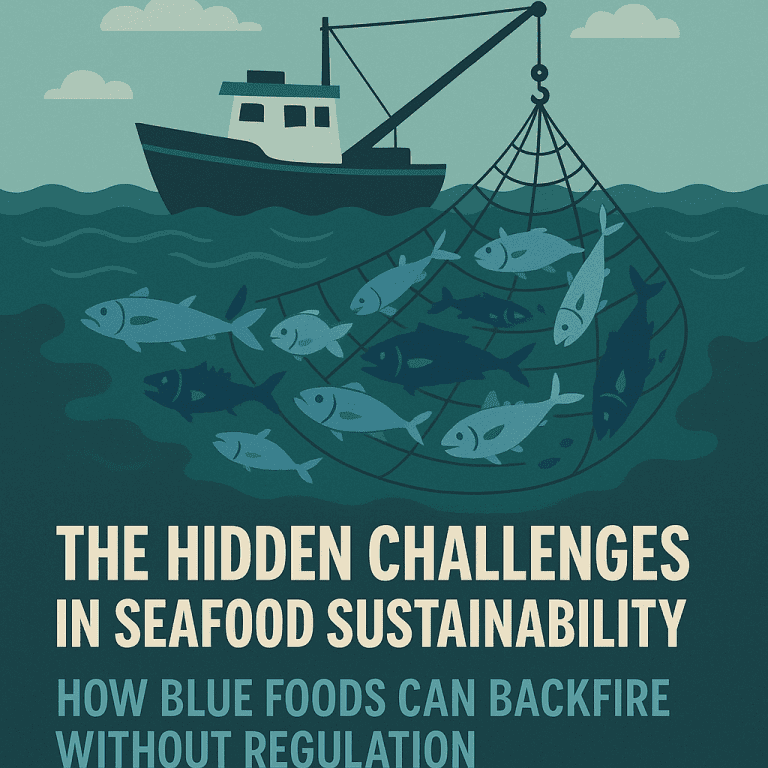Bangladesh in Global Climate Policy: Leading the Change
Do you ever think, why Bangladesh matters in the climate fight or What is the role of Bangladesh in global climate policy?
When floodwaters swallow rice fields in Satkhira or salt seeps into the ponds of Khulna, climate change ceases to be a distant threat and becomes a daily disaster. Bangladesh, with its 170 million people, sits at the forefront of this crisis. Despite contributing less than 0.5% of global emissions, the country suffers disproportionately from rising seas, intense cyclones, erratic rainfall, and growing displacement.
But Bangladesh is not just a symbol of climate vulnerability. It has emerged as a powerful advocate, negotiator, and innovator on the global climate stage driving climate justice, equity, and action for the Global South.
Why Bangladesh in Global Climate Policy Matters?
The Human and Environmental Toll
Bangladesh’s landscape tells a story of both beauty and burden. With its intricate delta system, fertile lands, and lush green paddies, it has been a symbol of agricultural resilience for generations. But today, it also represents ground zero for the unfolding global climate crisis.
Despite contributing less than 0.5% to global greenhouse gas emissions, Bangladesh is enduring some of the harshest impacts of climate change.
The Data Behind the Emergency:
- Over 20 million people may face displacement due to sea-level rise by 2050, according to the World Bank. This isn’t just about losing homes; it’s about losing livelihoods, cultural heritage, and community fabric.
- An astonishing 70% of the country is flood-prone, making it highly susceptible to the erratic and intense rainfall patterns exacerbated by a changing climate.
- Devastating events like Cyclone Amphan in 2020 inflicted an estimated $13 billion in losses, shattering infrastructure and crippling economies still struggling to recover.
- Salinity now affects more than 1 million hectares of farmland, rendering once-fertile ground infertile and forcing farmers to adapt or abandon their land.
These are not abstract figures they are human stories unfolding every season.
In Bhola, families abandon their homes each year as rising waters claim their land. Makeshift camps are now homes for people who once tilled fertile soils. Children in Sylhet often miss weeks of school due to flash floods, while farmers in Satkhira are switching to shrimp farming out of desperation, not choice sacrificing long-term soil health for short-term survival.
“We don’t want sympathy. We want solidarity. Bangladesh has lessons to share, and a right to lead.”
Environmentalist, Khulna
These lived experiences have shaped Bangladesh into more than just a nation in crisis it has become a moral and practical authority in the global climate discourse.
This is where the story shifts from problem to action, and from suffering to leadership.
How Bangladesh Became a Global Climate Voice
From Vulnerability to Vision
Bangladesh’s journey into global climate diplomacy didn’t happen by accident it was born out of necessity. As the consequences of climate change in Bangladesh became more severe, Bangladesh realized that raising its voice globally was not just an option it was a survival strategy.
Rather than waiting for the world to act, Bangladesh stepped up to influence how the world acts.
1. The Climate Vulnerable Forum (CVF)
Formed in 2009 and previously chaired by Bangladesh, the Climate Vulnerable Forum (CVF) is a global partnership of 58 nations that are among the most exposed to climate risks.
Bangladesh used its leadership within the CVF to:
- Promote the 1.5°C target, pushing the world to adopt a stronger emissions reduction goal
- Advocate for increased adaptation financing for vulnerable nations
- Emphasize the importance of just transitions and community-led adaptation
The CVF, under Bangladesh’s leadership, reframed the narrative from vulnerability to resilience and innovation.
2. The Vulnerable Twenty Group (V20)
In parallel, Bangladesh helped establish the V20, a bloc of finance ministers from climate-vulnerable countries working together to reform the global climate finance architecture.
Through the V20, Bangladesh:
- Championed the need for easier access to climate finance
- Called out the slow and unequal distribution of climate adaptation funds
- Proposed innovative finance mechanisms such as risk pooling, debt swaps, and climate insurance for small economies
By bringing finance into the climate conversation, Bangladesh helped elevate the economic case for climate justice.
3. Influencing COP Negotiations (UNFCCC)
At the UNFCCC Conferences of the Parties (COPs), Bangladesh has become a vocal and respected negotiator, representing not just its own interests, but those of all Least Developed Countries (LDCs) and Small Island Developing States (SIDS).
Bangladesh’s key asks at global climate summits consistently include:
- A fully operational and financed Loss and Damage Fund
- Access to technology and innovation for climate adaptation
- Reform in global climate finance systems to ensure equity and transparency
At COP27 and COP28, Bangladeshi delegates played an influential role in shaping how “Loss and Damage” was recognized leading to the establishment of a fund that developing countries have been demanding for decades.
Bangladesh’s growing presence on global platforms is not about prestige it’s about survival, justice, and leadership born of experience.
The next section will explore how this global advocacy is rooted in local realities from coastal farmers to community health workers each one shaping the country’s powerful climate diplomacy.
Key Contributions of Bangladesh in Global Climate Policy to Diplomacy
Leading from the Margins with Maximum Impact
In the global discourse on climate change, Bangladesh has emerged as a nation that punches well above its weight. With no historic responsibility for emissions and a population deeply exposed to the climate crisis, Bangladesh has earned global recognition not by power but by purpose.
Through smart diplomacy, coalition-building, and evidence-backed leadership, the country has made tangible contributions to climate governance.
Here’s how Bangladesh transformed climate vulnerability into climate leadership:
1. Climate Vulnerable Forum (CVF)
Impact: Gave 1.5 billion+ people a united voice in global climate talks
The Climate Vulnerable Forum (CVF) is a coalition of countries most exposed to the climate emergency ranging from small island states to low-lying delta nations like Bangladesh. The country was instrumental in founding and chairing this group, shaping it into a formidable diplomatic bloc.
Under Bangladesh’s leadership, the CVF:
- Championed the 1.5°C target, influencing the 2015 Paris Agreement
- Elevated climate justice and survival rights to top-level negotiations
- Established the CVF Presidency Troika, ensuring continuity and long-term vision
“This is not just about science; it’s about survival. Our people are living the projections others only discuss.”
Dr. Saleemul Huq, late CVF Special Advisor
By uniting over 58 nations with a shared vision, the CVF steered by Bangladesh shifted the global climate conversation toward morality, equity, and ambition.
2. V20 Alliance – Reframing Climate Change as an Economic Crisis
Impact: Made climate finance central to global negotiations
Bangladesh also played a foundational role in launching the V20 (Vulnerable Twenty Group), a coalition of finance ministers from CVF countries. This initiative was born from a crucial insight: climate change is not just an environmental issue it is a financial and developmental emergency.
Key outcomes of V20 leadership:
- Advocacy for restructuring global climate finance to prioritize vulnerable nations
- Promotion of climate risk insurance, sovereign climate budgeting, and green fiscal tools
- Establishment of cost-of-inaction models, quantifying climate damages to national economies
Bangladesh’s leadership here helped elevate finance ministers into the heart of climate decision-making.
The World Bank’s Country Climate and Development Report (2022) highlighted:
“Average tropical cyclones cost Bangladesh about $1 billion annually…In case of severe flooding, GDP could fall by as much as 9 %.”
3. Loss and Damage Fund – Turning Moral Demand into Policy Outcome
Impact: Accelerated its adoption at COP27 and COP28
For decades, the idea of Loss and Damage (L&D) compensation was resisted by wealthier countries. But thanks to relentless advocacy by countries like Bangladesh, the world finally agreed to establish a dedicated Loss and Damage Fund at COP27 and began operationalizing it at COP28.
Bangladesh’s role:
- Served as a spokesperson for LDCs and CVF
- Submitted technical recommendations on fund design and access
- Built coalitions with Pacific Island nations, African states, and NGOs for stronger diplomatic pressure
Today, Bangladesh continues to advocate for:
- Equitable governance of the L&D fund
- Easy, non-bureaucratic access for frontline communities
- Expanded scope to include non-economic losses, such as cultural heritage and ecosystem destruction
4. G77+China Bloc – Strengthening Developing Country Solidarity
Impact: Advocates for fair climate finance and development space
Within the G77+China, a bloc of over 130 developing countries, Bangladesh acts as a bridge-builder supporting both Least Developed Countries (LDCs) and emerging economies.
Key priorities Bangladesh advances within this bloc:
- Differentiated responsibilities between developed and developing nations
- Protection of development rights in the face of climate constraints
- Support for technology transfer and capacity building
This role is particularly critical in ensuring that climate ambition does not come at the cost of poverty eradication and development justice.
These contributions aren’t just symbolic they have helped shape global climate rules and funding flows. Bangladesh’s model of policy-driven diplomacy anchored in lived experience and data is now inspiring other vulnerable nations to lead boldly.
Now, let’s explore what lies ahead.
Diplomacy Rooted in Lived Experience
How Bangladesh’s Global Advocacy Reflects Local Realities
Global diplomacy often risks sounding disconnected from the lives of ordinary people. But in Bangladesh, climate diplomacy begins with real stories from farmers battling saltwater intrusion to families fleeing river erosion. Every demand at COP, every push for funding, is grounded in firsthand experience.
This deep connection between policy and people makes Bangladesh’s climate voice both credible and compelling.
Satkhira – Salt in the Soil, Strength in the People
Once a hub for rice cultivation, Satkhira now resembles a patchwork of shrimp farms and saline wastelands. Rising sea levels and frequent cyclones have pushed saltwater deep into the region’s groundwater.
Abdul Jalil, a 58-year-old farmer from Satkhira, remembers when he could grow three rice crops a year.
“Now I can’t grow anything but shrimp and even that depends on the weather. The water is no longer our friend.”
The Bangladesh delegation’s demands for adaptation finance, climate-resilient crops, and technological support for coastal farmers are driven by stories like Jalil’s. These aren’t distant hypotheticals they’re daily decisions between food and debt.
Bangladesh is advocating for international support not as charity, but as a global responsibility to repair global harm.
Sundarbans – The Dying Shield
The Sundarbans, the largest mangrove forest on Earth, acts as a natural storm barrier, protecting over 4.5 million people across southern Bangladesh and West Bengal. But the shield is weakening.
Increased salinity, rising sea levels, and cyclone surges are killing mangrove species like golpata and keora. With them, fish nurseries, honeybee colonies, and ecotourism jobs are vanishing.
“We planted 2,000 trees last year and lost half to saltwater intrusion,” says Rehana Akter, a community reforester from Shyamnagar. “Without the forest, we have no home.”
At global forums, Bangladesh uses the Sundarbans example to champion:
- Blue carbon finance for mangrove preservation
- Funding for ecosystem-based adaptation
- Support for community-managed conservation efforts
These aren’t just environmental issues they’re economic and existential.
Bhola – The Island of the Displaced
Bhola, a riverine island in southern Bangladesh, is shrinking.
In the last two decades, thousands have been forced inland due to river erosion, tidal surges, and increasingly erratic rainfall. Many end up in urban slums in Dhaka, cut off from their ancestral livelihoods and exposed to new vulnerabilities poverty, poor housing, and joblessness.
One such migrant, Jamal Uddin, now works as a rickshaw puller.
“I had land. I had goats. Now I have a plastic roof and mud on my shoes.”
Bangladesh’s global climate diplomacy is now increasingly centered around climate-induced displacement urging the world to recognize and support people like Jamal through:
- Climate migration frameworks
- Urban climate resilience funding
- Social protection for displaced communities
This lived reality reinforces the call for climate action rooted in dignity and human rights.
Why Local Voices Matter on the Global Stage
What sets Bangladesh apart is how it elevates community stories into international policy. Every Bangladeshi delegate to COP carries not just data, but deep moral testimony. The climate crisis in Bangladesh isn’t abstract it’s visible in every flooded field, every saline well, every broken dike.
The Gaps and the Fight Ahead
Confronting the Global Climate System’s Injustices
Bangladesh has become a respected voice in climate diplomacy, but respect does not equal results. Despite decades of advocacy and leadership, the country and others like it still face systemic barriers in accessing the resources and influence needed to respond to the climate emergency.
Delayed and Difficult Climate Finance
Although wealthy nations pledged $100 billion annually to help developing countries adapt to climate change and cut emissions, much of that money remains undelivered or tied up in red tape.
- Only about 20–30% of climate finance reaches Least Developed Countries (LDCs)
- Projects often involve complex approval processes with multilayered donor requirements
- Funds are channeled through large international agencies, bypassing local actors
For a small NGO in Khulna or a coastal cooperative in Patuakhali, accessing international climate funds is virtually impossible.
“We fill out forms, send proposals, attend workshops nothing comes through. The money moves, but not to us.”
Kamal Uddin, Local Development Worker, Barisal
This fuels frustration and undermines real adaptation work being done on the ground. Bangladesh continues to push for:
- Simplified, direct-access finance mechanisms
- More grants than loans, especially for adaptation
- Capacity building for community-led climate action
Imbalance of Power in Climate Negotiations
Although countries like Bangladesh bear the brunt of climate change, they have limited influence in climate rulemaking compared to high-emission economies.
At forums like COP, the negotiating blocs of the Global South (G77, LDC Group) are often overshadowed by the priorities of the Global North.
- Decisions are frequently shaped by political deals, not scientific urgency
- Voices of frontline nations are often relegated to side events instead of the main stage
- Negotiations prioritize market-based solutions, not justice-driven frameworks
This imbalance is not just unfair it’s dangerous. Without meaningful inclusion, global agreements risk failing the people most affected.
Bangladesh continues to call for:
- Equitable representation in decision-making bodies
- Recognition of climate justice and historical responsibility
- Binding commitments, not just voluntary pledges
Donor-Led Development, Not Locally-Led Solutions
Many international climate projects implemented in Bangladesh follow donor-driven models that often ignore local realities.
- Program designs come from consultants in Geneva or Washington, not Gaibandha or Cox’s Bazar
- Local organizations become sub-contractors, not partners
- Innovation and traditional knowledge are underutilized
As a result, some projects fail to meet their goals or even harm local ecosystems and social structures.
“We have solutions here like floating gardens or raised tube wells but they’re rarely funded or scaled up.”
Fatema Begum, Farmer and Community Leader, Gopalganj
Bangladesh advocates for a shift in development models from top-down interventions to bottom-up resilience building supported by:
- Flexible funding for local innovation
- Inclusive project design with affected communities
- Emphasis on local knowledge systems alongside global tech

Bangladesh’s Push for a Fairer Climate Framework
Despite these gaps, Bangladesh remains steadfast and solution-oriented in its diplomacy. In every negotiation room, it brings forward bold but practical reforms, including:
- Establishing direct-access funds that bypass intermediaries
- Promoting regional climate finance hubs for South-South collaboration
- Advocating for climate reparations and risk-sharing mechanisms
- Enhancing transparency and accountability in donor-country commitments
By focusing on justice, equity, and effectiveness, Bangladesh is pushing to redesign the global climate architecture to serve the people it is meant to protect.
Bangladesh’s moral clarity, diplomatic skill, and lived experience make it a unique and increasingly essential leader in reshaping how the world responds to climate change. But the journey doesn’t end with pointing out gaps. It continues through vision, innovation, and partnerships for progress.
Future of Bangladesh in Global Climate Policy: Vision and Action
Turning Vision Into Implementation
With global recognition secured, Bangladesh now faces a new challenge: translating its diplomatic influence into tangible national outcomes. This next chapter involves smart planning, inclusive implementation, and international partnerships that move from commitment to impact.
Strengthening National Adaptation Planning (NAP)
Bangladesh is currently finalizing its National Adaptation Plan (NAP) a long-term strategy to integrate climate risks into all sectors, from health and housing to energy and water.
Key pillars include:
- Mapping climate-vulnerable zones and sectors
- Mainstreaming adaptation into national and local budgets
- Creating a monitoring framework to track resilience gains
The NAP is expected to guide investments for the next decade and is designed to align with the LDC 2050 Vision and SDG targets.
Accelerating Renewable Energy Transition
Though still heavily reliant on fossil fuels, Bangladesh is increasingly investing in renewables.
National goals include:
- Achieving 40% clean energy by 2041
- Expanding solar irrigation, mini-grids, and biogas projects
- Mobilizing private sector and multilateral investments through IDCOL and SREDA
Clean energy not only reduces emissions but also strengthens energy access and rural development.
Empowering Women and Youth in Climate Leadership
Bangladesh is intentionally engaging its young population and women in climate action.
Programs include:
- Youth climate councils in 40+ districts
- Women-led adaptation projects in char and haor areas
- Vocational training for green jobs like solar installation, waste recycling, and aquaculture management
Bangladesh understands that inclusive climate leadership is not just fair it’s effective.
Strengthening South-South and Global Partnerships
Moving forward, Bangladesh is expanding its role as:
- A mentor nation in the Global South, sharing adaptation strategies with Africa and the Pacific
- A thought partner in global policy forums (e.g., CVF+, UNFCCC)
- A host of international collaborations for climate-smart agriculture, resilient infrastructure, and disaster preparedness
“We have gone from being helped to helping others. That’s a sign of true leadership.”
Dr. Ahsan Habib, Development Economist
At EcoNature BD, we bridge policy with practice. From char villages to UN chambers, we connect local resilience with global climate goals. Our team:
- Trains communities in adaptive farming and water management
- Develops research-backed policy briefs for decision-makers
- Facilitates youth-led climate innovation
- Marine protection project related to MPA network
Looking to collaborate on climate policy, resilience, or advocacy in Bangladesh?
Contact EcoNature BD today →
FAQs: Bangladesh in Global Climate Policy
- Why is Bangladesh important in global climate policy?
Because it represents climate-vulnerable nations, advocates for equity, and offers scalable solutions.
- What is the V20 and what does Bangladesh do there?
The V20 is a coalition of vulnerable finance ministers. Bangladesh was a founding voice and shapes financial justice discussions.
- How is climate change affecting Bangladeshi communities?
From displacement to crop loss, the impacts are severe. People in coastal and char areas are most affected.
- What are Bangladesh’s climate policy priorities now?
Adaptation finance, renewable energy, capacity building, and fair access to climate funds.
- How does EcoNature BD support climate action?
By connecting research, community engagement, and climate leadership for long-term impact.
Bangladesh is no longer just sounding the alarm. It’s offering the blueprint.






